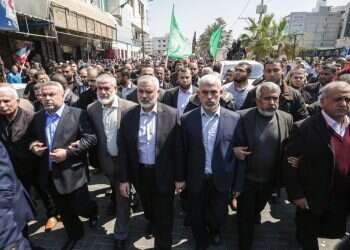Three days before the scheduled start of talks between the Iranian regime and representatives of US President Donald Trump in Oman, the gaps between the two sides regarding both the format of the talks and the subjects to be discussed appear especially wide.
The primary point of contention is how the talks will be conducted. According to a senior American official quoted by The Washington Post, Trump's envoy Steve Witkoff insists that the talks must be held directly or not at all. The report adds that Witkoff is even prepared to travel to Tehran to conduct the negotiations if invited.
On the Iranian side, officials continue to emphasize that the talks will not be direct, and that Oman's Foreign Ministry will serve as mediator. Such statements were made by Foreign Minister Abbas Araghchi, his office, and President Mohammad Pezeshkian. Another dispute that threatens the very launch of the talks is Iran's demand that sanctions be gradually lifted during the negotiations, rather than only at their conclusion, if and when an agreement is reached. Sources familiar with the negotiations said Iran initially demanded a freeze on sanctions as a precondition for the talks, but was forced to back down.

Another major dispute concerns the agenda for the talks. Iran firmly rejects any discussion of its missile program, particularly in light of reports that Israel is pressing the US to include this issue in the negotiations. Javan, a conservative Iranian newspaper aligned with the Islamic Revolutionary Guard Corps, wrote in an editorial that any attempt to bring the missile issue to the table would result in the immediate termination of the talks.
Conversely, according to Israeli and American sources, the talks are expected to address limits on Iran's long-range missile program, including hypersonic missiles currently being developed with Russian assistance. US State Department spokesperson Tammy Bruce said this is one of the issues to be discussed in order to "determine what limits can be allowed."
Another disagreement involves Iran's support for terrorist organizations and entities in the Middle East and beyond. This follows recent reports of renewed weapons and rocket shipments to Hezbollah by sea, and of transfers of long-range missile stockpiles to pro-Iranian Shiite militias in Iraq. Iran's Foreign Ministry issued a brief statement rejecting any attempt to attribute substantial influence to Iran over other actors in the region and called on the US to begin direct negotiations with those entities.
Interestingly, the gaps appear smaller on the issue of Iran's nuclear program and uranium enrichment - the central issue of the talks. The official Iranian position is that it has no intention of developing a nuclear bomb, but rather seeks nuclear capabilities for civilian purposes. This, despite Iran enriching uranium to high levels suitable for weapons, which have no use in civilian energy production.

President Pezeshkian said Wednesday, in a speech marking Iran's Nuclear Technology Day (a coincidental timing), "We are not seeking to develop a nuclear bomb. In this country, who has more authority than the supreme leader? He issued a formal fatwa banning the construction of a nuclear bomb."
He claimed that inspectors from the International Atomic Energy Agency (IAEA) have free access to Iran's facilities. However, the IAEA has long warned that Iran is blocking access to its Natanz and Fordow facilities. According to The Jerusalem Post, Trump told Israeli Prime Minister Benjamin Netanyahu that Iran would not be allowed to obtain nuclear weapons, but civilian nuclear activity would be permitted.
Assuming the report is accurate, the talks will therefore address oversight of enriched uranium removal from Iran and supervision of facilities to ensure Iran halts further enrichment and does not make technological progress toward building other components of a nuclear bomb. Given Iran's track record and the challenges of international oversight, as well as the problematic 2015 agreement, it is unclear what improvements the Americans can make and what effective monitoring mechanisms can be established to ensure Iran does not acquire a bomb.
Russia, seeking to show that it is involved, has expressed strong opposition to any attack on Iran if the talks fail. The US has announced the talks will be limited to 60 days from their start on Saturday, after which "Iran will be in hell."
Russian Foreign Ministry spokesperson Maria Zakharova said that an attack on Iran would severely undermine efforts to reach a genuine solution and that diplomacy is the only path forward. Europe is also attempting to intervene. According to reports, Deputy Head of Foreign Policy at the European Union, Olaf Skoog, met in Vienna with Iranian Deputy Foreign Minister Takht Ravanchi. The two discussed oversight of Iran's nuclear program and the lifting of sanctions.




